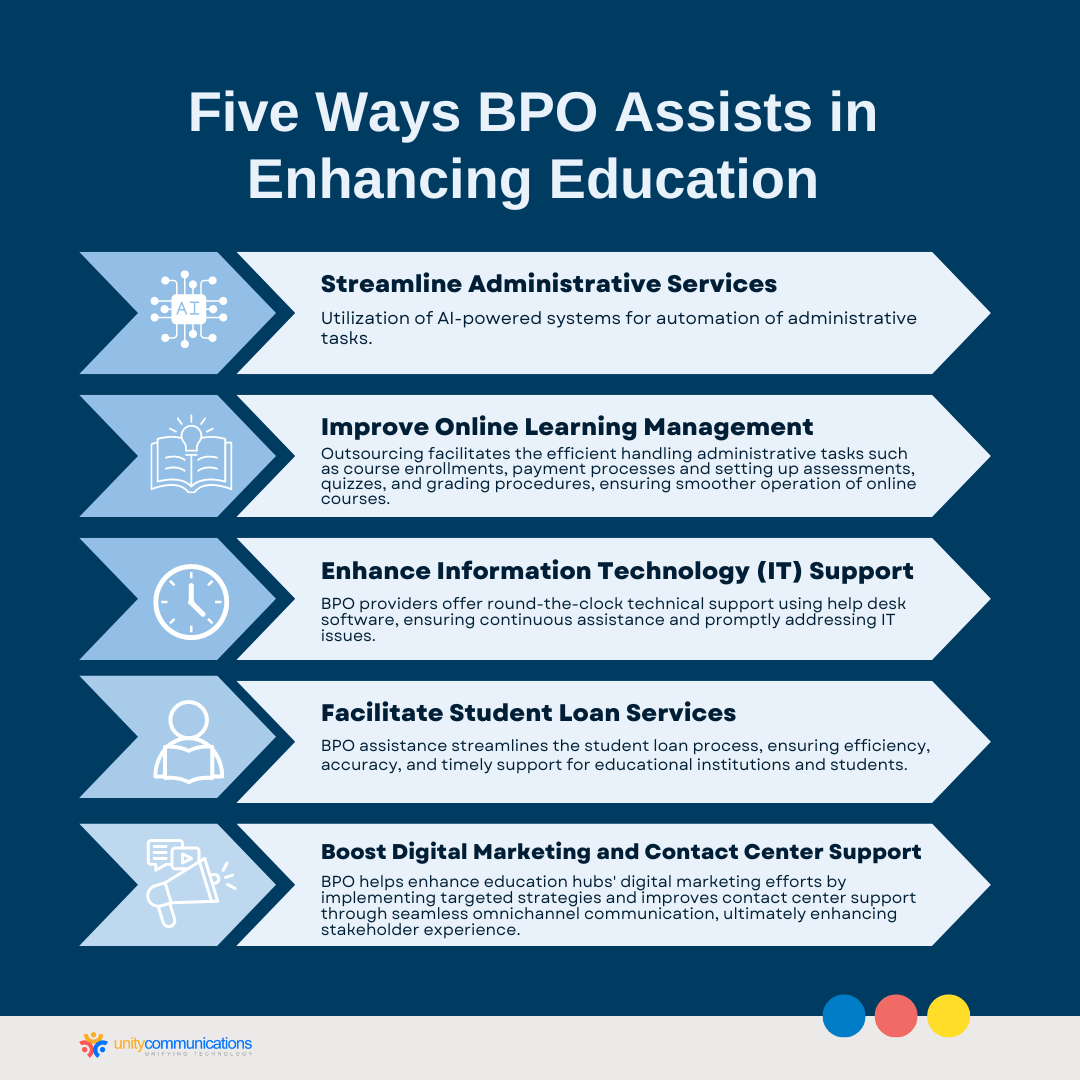Table of Contents
Dealing with thousands of students every school year challenges educational institutions. They must meet each student’s needs without delaying the learning process. They have to be sure their front- and back-office operations will not cause any disruption.
Business process outsourcing (BPO) providers have the best solutions to guarantee seamless operations. Their skilled workforce and up-to-date technology support schools, colleges, universities, and e-learning providers in delivering an unmatched educational experience.
Do you want to learn how to provide top-notch education through outsourcing? Keep reading to discover BPO’s critical role in advancing the education segment.
Why Is BPO Crucial to Improving Learning Processes?

BPO gives educational organizations the flexibility to optimize their learning processes. By taking over non-academic tasks like those listed below, providers let these institutions focus on curriculum development, faculty training, and student engagement.
- Administrative support (e.g., data entry and student records management)
- Technical support (e.g., help desk assistance and software development)
- Facilities management (e.g., cleaning and repair services)
- Human resources (HR) support (e.g., recruitment and payroll processing)
- Finance and accounting (e.g., bookkeeping and budgeting)
- Enrollment and admissions (e.g., student application management)
- Marketing and communication (e.g., social media monitoring and content creation)
- Transportation assistance (e.g., school bus services)
- Event organization (e.g., workshop and conference preparations)
- Knowledge and legal processing (e.g., industry research and compliance auditing)
- Library services (e.g., resource digitization and cataloging)
- Student support (e.g., loan services and career guidance)
Service providers enable such efficiency by equipping their employees with expertise in specific functions of BPO. Artificial intelligence (AI) and automation solutions help them complete those non-core tasks more quickly and accurately.
Moreover, vendors charge their services hourly or monthly, depending on an institution’s current requirements. Clients do not need to worry about real estate, infrastructure, or other utility costs; BPO companies handle all these resources.
This advantage allows educational institutions to cut operating expenses. They only need to allocate a budget to pay for third-party personnel. They also gain scalability because they can hire experts without performing extensive training. These BPO professionals can perform tasks whenever needed, especially during peak enrollment periods.
Because of such benefits, the global BPO market achieved $266.8 billion in revenue in 2023. Market.Us projects the sector to grow continuously and reach a market value of $544.8 billion by 2032.
Five Ways BPO Assists in Enhancing Education

After knowing what BPO’s general importance is in boosting the education process, understanding how this practice explicitly supports an organization is crucial. This knowledge guides the development of a budget plan that balances core and non-core resources.
Whether short-term or long-term, here are five specific ways BPO supports the delivery of high-quality education.
1. Streamline Administrative Services
Besides employing skilled personnel, providers use various AI-powered systems to automate repetitive administrative tasks in the education sector. These technologies increase efficiency and accuracy in handling data entry, enrollment processing, and other back-office functions.
- Cloud-based solutions for safe and seamless data storage, access, and organization
- Enterprise resource planning (ERP) platforms for automated workflows and reports
- Learning management systems (LMS) for course content development and oversight
- Robotic process automation (RPA) tools for accelerated rule-based admin work
- Data analytics solutions for fast and accurate information analysis and reporting
- Web and mobile portals for smooth student and faculty request tracking and response
- Robust cybersecurity tools for enhanced data and system protection
- Omnichannel platforms for real-time remote communication and collaboration
2. Improve Online Learning Management
Enhancing e-learning is among BPO’s crucial responsibilities in the education sector. Given the post-pandemic boom in online learning, educational institutions encounter a growing number of tasks and backlogs.
The global e-learning market is expected to expand at a compound annual growth rate (CAGR) of over 9% by 2030. In line with this, schools, colleges, universities, and online learning centers expect more work to come their way. They can avoid pitfalls and prioritize providing uninterrupted online education by outsourcing the following processes:
- Secure, maintain, and update LMS tools
- Create interactive online course content
- Produce high-quality video lectures, animations, and other visual aids
- Handle course enrollments and payment processes
- Manage secure student and faculty access to online courses
- Set up online assessments, quizzes, and grading procedures
- Provide 24/7 help desk assistance
- Facilitate live virtual classroom sessions and webinars
- Execute gamification and engagement strategies
- Optimize online courses for mobile devices
3. Enhance Information Technology (IT) Support
BPO providers assist in improving IT systems and providing support for education centers. Service providers perform the enumerated functions more rapidly with their skilled IT specialists and modern tools. They allow client institutions to minimize system downtime and deliver quality education.
- Provide round-the-clock tech assistance using help desk software
- Prioritize urgent IT support requests identified through automated ticketing systems
- Monitor campus servers, networks, and databases
- Perform software updates and cybersecurity services
- Execute data backup and disaster recovery strategies
- Digitize and migrate paperwork to the cloud
- Host IT training and workshops
- Monitor IT systems and draft related reports
- Create and handle official student, faculty, and personnel accounts
- Configure and maintain on-premises infrastructures
4. Facilitate Student Loan Services
Service providers help educational institutions handle the entire student loan application process. Their BPO roles and responsibilities include collecting and verifying student data to ensure eligibility.
Besides, providers assist students with concerns about their loans, addressing inquiries regarding repayment schedules, interest rates, and other matters. They ensure timely and accurate loan disbursement and repayment by preparing statements and sending monthly notifications.
5. Boost Digital Marketing and Contact Center Support
Hiring the right BPO provider aids education hubs in boosting digital marketing and contact center support. Third-party vendors work closely with these institutions to develop and implement well-structured digital marketing plans to reach their target audience effectively.
Their strategies include content creation and management, social media marketing, and email campaigns. Search engine optimization (SEO) and pay-per-click advertising are also options.
Regarding contact center support, BPO companies use omnichannel solutions to address student, faculty, and parent concerns seamlessly. This integrated, multichannel service allows stakeholders to seek assistance using their preferred communication method, personalizing their experience.
The Bottom Line

Like other sectors, the education industry needs BPO services to save costs, increase efficiency, and optimize third-party expertise and technology. Delegating non-academic tasks to service providers lets educational institutions concentrate on delivering high-quality learning.
Besides these common benefits, vendors help schools, universities, colleges, and e-learning hubs simplify administrative and IT functions. They also help improve student services by taking charge of remote learning, loan management, digital marketing, and contact center processes.
Let’s connect if your institution needs outsourcing. Unity Communications has well-trained professionals and robust solutions ready to fulfill your non-academic tasks.



